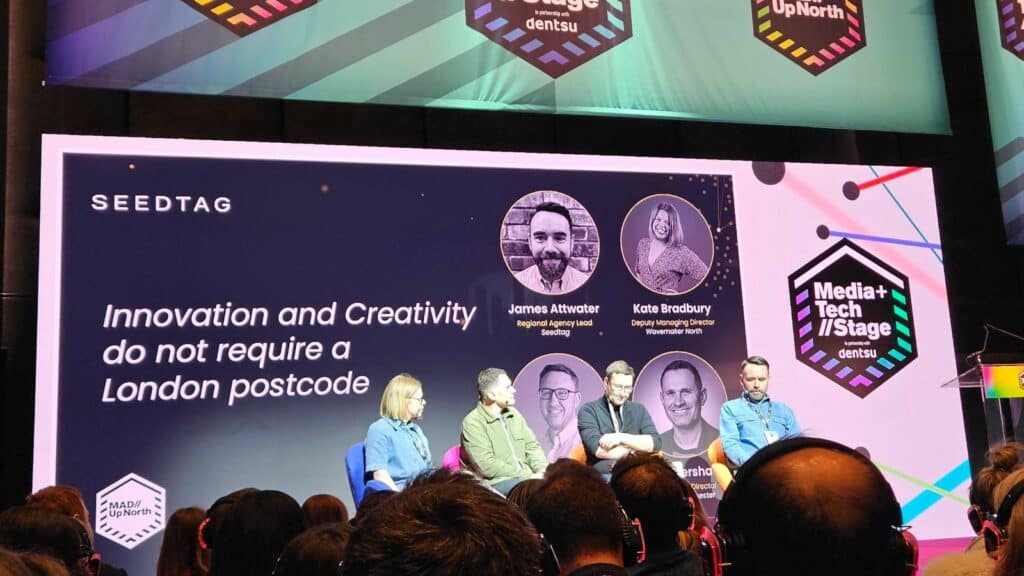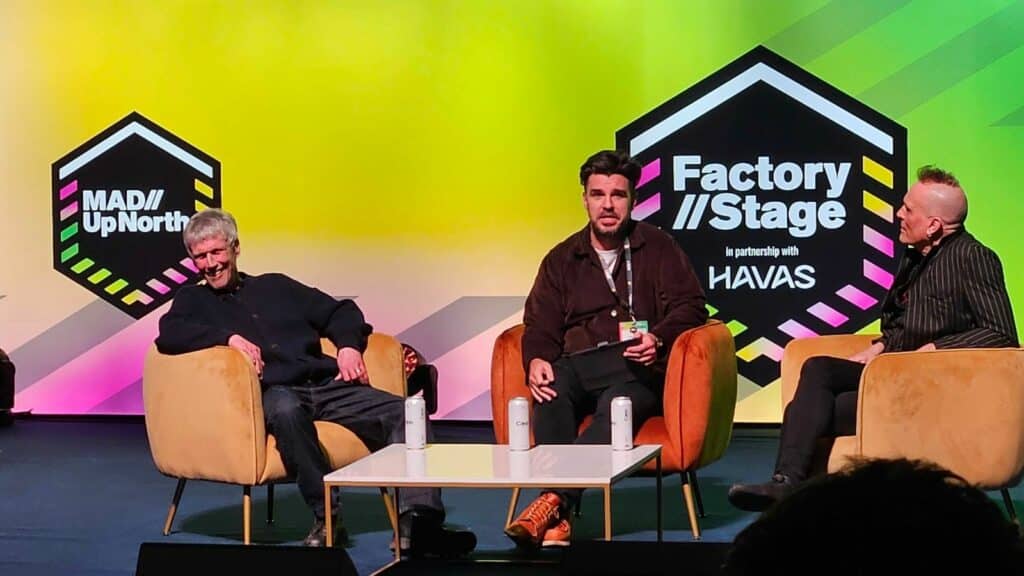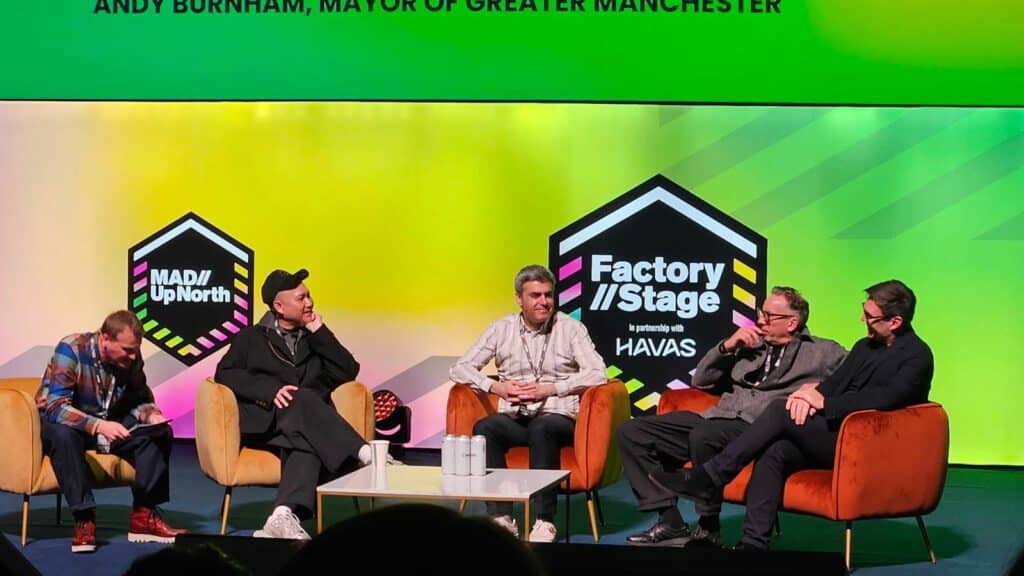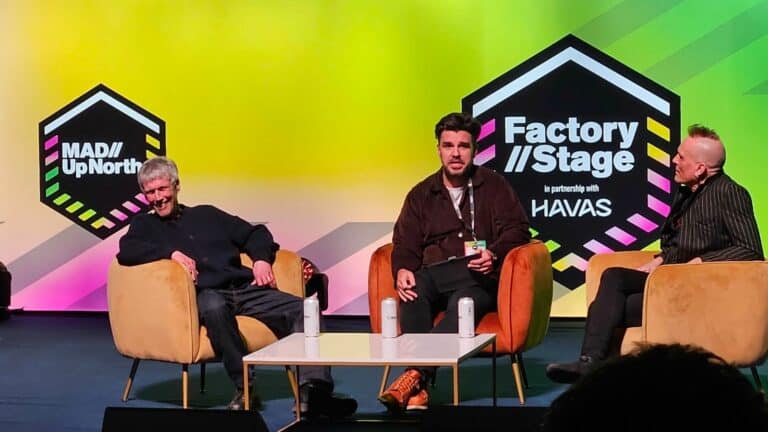Thanks to queue ‘chaos’ there were some initial teething problems as MAD//UpNorth landed at Manchester’s Aviva Studios for day one of the festival.
The highly anticipated event left some attendees waiting in the queue for more than two hours, with a number of frustrated festival goers taking to social media to call it a ‘shambles’ and ‘hectic’.
Once inside, there was an initial one in, one out, system to get to different stages due to the crowd size.
In a statement, the organisers emailed attendees to apologise for the queues and urged them to arrive early ahead of day two: “Hands up – apologies for the long queues at MAD//UpNorth today. We have had an issue with our new ticketing and have been working hard to fix it.”
Towards the afternoon once the dust settled and the queues dispersed, it was well worth the wait to hear from the likes of Bez from Happy Mondays bringing the humour and reflections on his Hacienda days, Greater Manchester mayor Andy Burnham looking back at his career and Manchester’s journey as a creative region, and a deep dive into why innovation and creativity does not require a London postcode.
As MAD//Fest’s first-ever outing in Manchester, a few hiccups were to be expected so hopefully there have been some lessons learnt as the festival enters day two. But for now, here are the top five things I learnt from the first day.
We should shout “louder and prouder” in the North
On the Media + Tech Stage hosted in partnership with Dentsu, there was a real focus on the creativity, strategic thinking, and talent emerging from Northern cities during a panel session on how innovation and creativity do not require a London postcode. Kate Bradbury, regional deputy managing director at Wavemaker, set the scene for regional agencies beyond London and hailed Manchester as a city with a great talent pool with network agencies investing in campuses.

According to Chris Turner, managing partner – head of programmatic services UK & digital investment EMN at EssenceMediacom, there are both challenges and opportunities for regional agencies. The future is “positive” but it is still a challenging market.
On the obstacles agencies in the North face, Bradbury said ‘non-London agencies’ suggests “we are different, inferior and not as good” and with great work emerging from the North agencies need to “shout louder and prouder”. When it comes to talent, Jon Kershaw, MD at PHD Manchester, said people shouldn’t have to move to London for a great media career anymore and there should be more investment in roles and the “talent will stay”.
As for the future, he hopes more agencies based outside of London will be on client pitch lists based on merit – not “forced”.
“Brand and retail media should not be looked at separately”
Over on the retail media stage, SMG’s senior insight director Bianca Hall delved into how to optimise your commerce media measurement strategy, breaking down the key metrics to harness data and get results.
She outlined how there is “data fatigue” with so many measurement tools available and showcased how brands can stand out in three key ways. Brands need to learn to ‘walk’ first, building foundations and a bank of short-term ROI evaluations which include standardisation; incrementality; details that drive decisions; and considering how a one size fits all approach doesn’t fit all.
Next, brands need to ‘run’ and take things to the next level asking who saw the media, if it led to sales and question if there has been a shift in behaviour. Brands should start with the “end in mind” and standardisation isn’t as clear cut here, brands need to beware of the temptation of a strong short-term ROI and detail is just as important.
For brands to ‘fly’ for long-term success, it’s all about bringing everything together, navigating roadblocks, being transparent and experimenting. “Retail media can build brand awareness,” she explained. “Brand and retail media should not be looked at separately, retail media is a brand building tool”.
Major brands won’t exist in ten years time in their ‘current guise‘
Roger Wade took to the Factory Stage, held in partnership with Havas, sharing his impressive 30-year career including founding fashion brand Boxfresh in 1990 and later, building pop-up mall Boxpark in 2010 which he transformed from a £5m turnover business to £20m and sold within 10 years.
At 55 he planned to retire but wanted to spend his last part of his life giving back, so now he runs an impact consumer brand venture capital fund called Boxfund, which invests in entrepreneurs that have both business success and positive impact.
His secrets to making money? It’s about knowing your field and business better than anyone else. He predicts major consumer brands won’t exist in ten years time in their current guise, thanks to the emergence of quantum computing and education about the “damage bad brands do to your body”.
The “future of consumer brands will be impact brands”. On investment, he warned to “be aware” of selling to PE as they will often “dangle a valuation carrot”. It’s “really tough to raise money now” and as a consumer brand, it’s all about having a great team, product and road to profitability in place.
On how the VC world likes the term ‘unicorns’ with tech companies valued at over £1bn, he said it is a lot of “bullsh**” and it should just be about “profitable” businesses.
Bez from Happy Mondays: “Hacienda played a key role in the development of Manchester“
Meanwhile founder James Cross, journalist and musician John Robb and Bez from the Happy Mondays appeared over on the Factory Stage to discuss the difference the Hacienda, Madchester, and the culture of the 80s and 90s has had on Manchester as a brand.
Charting his rise to fame and reflecting back on his Hacienda days, Bez said Manchester was “so run down” in the early 70s but has continued to transform over the years: “Sometimes don’t recognise where I am anymore,” he said. Teasing that Manchester is the New York of England he added that it’s “amazing how Manchester has grown in the past 20 years.”

Hacienda also played a “key role” in the development of Manchester with John Robb adding that “everything has changed” – even the Aviva Studios building has influences of punk. People used to “laugh” at the Hacienda as it was “so posh” – but now all of Manchester is like that he said.
It’s “easier to be a creative here as it’s more affordable” and bands like Happy Mondays “wouldn’t have existed” in London, but in Manchester there has always been space for creativity.
It took five years for the band to get noticed and if it wasn’t for Factory Records, Happy Mondays wouldn’t have made the “same mark” if it was the same today thanks to the digitisation of music, explained Bez.
“I feel sorry for young bands now,” said John Robb as for more and more bands, it’s only those that can afford it that seem to cut through. But the duo don’t think Manchester is held back by nostalgia, Robb asked why can’t Manchester be one of biggest cities in Europe and reflected on how the late Tony Wilson would always be happy to talk about the vision, future and transformation of Manchester you ever bumped into him on the street.
13,000 Londoners have relocated to Manchester in the last three years – Burnham
It was all about the Northern Creative Powerhouse next with the final panel of the day hosted by Paul Cooper, COO at EssenceMediacom North who was joined by Kee-Hong Low, creative director at Factory International; Mike Ingall, CEO and founder at Allied London; Andy Burnham, mayor of Greater Manchester; and Louis Georgiou, VP engineering Agentic Intelligence Choreograph – WPP.

Burnham, reflecting on his own journey, tried to work in the creative Industries and journalism back in 1991 post university but it “wasn’t a good place back then” as things had closed or left. For anyone in the North West in the early 80s, there came a point if you “truly wanted to get on in life” you had to move down South – and that’s what he had to do.
Greater Manchester has been on a “journey” and in the last decade has been growing “significantly faster” than the UK economy at just under 3% a year on average. On why this has happened, he credited greater devolution powers to do “more for ourselves”.
“We’re a bit of an island of sanity in an increasingly mad world. Mad up North? We’re not so mad here.”
Greater Manchester’s approach is “stable” and “long-term” that’s pro business and entrepreneurial, adding that the city region continues to invest and has “never have stopped” even in tough times it “backs” its big cultural organisations. Now, he believes it’s an “exciting place” for young people to stay and build creative careers – and there’s no longer a need to move down to London.
“There’s a reverse migration coming up from London now, because I think people in their 20s based in London realise that you can have a much better life in Manchester,” he explained. “13,000 Londoners have relocated to Manchester in the last three years, young Londoners. We’ve got our own talent that we’re trying to bring through, but at the same time, people are coming to study, stay and move here. It’s all happening in Manchester right now.”
Mike Ingall from Allied London was equally passionate about Greater Manchester and said it is the “home of commercial TV” as it didn’t start in London – it started here.
Manchester has music, media, fashion and the arts and Allied London set out to create a place that will “encourage employment”. In the next 15 years he predicted this is “only going to get bigger” as Manchester is at the “heart of the knowledge economy”.









